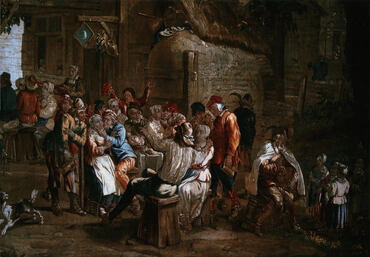8858. A person's whole character is determined by the nature of whatever dominates his life; this is what marks him off from others. His heaven is formed in accordance with it if he is good, or his hell if he is bad. For it constitutes his true will and so the true being of his life, which is unchangeable after death. From all this one may see what the life is like in a person who has been regenerated, and what it is like in one who has not been regenerated.
Arcana Coelestia#9286
9286. 'Three times you shall keep a feast to Me in the year' means enduring worship of the Lord and thanksgiving on account of deliverance from damnation. This is clear from the meaning of 'keeping a feast' or 'holding a feast' as worshipping the Lord with gladness of mind on account of deliverance from damnation, dealt with in 7093; and from the meaning of 'three times in the year' as a state complete right to its end, for 'three' means complete from the beginning to the end, 2788, 4495, 7715, 9198, and 'year' a whole period, 2906, 7839, 8070. At this point therefore complete and whole deliverance is meant; for 'the feast of unleavened bread' means purification from falsities, 'the feast of harvest' means the planting of truth in good, and 'the feast of ingathering' means the implanting of good from there. Thus complete deliverance from damnation is meant by these feasts; for when a person has been purified from falsities, and after this has been brought by means of truths into good, and is at length governed by good, he is in heaven with the Lord and has accordingly undergone complete deliverance.
[2] The consecutive stages of deliverance from damnation are like the consecutive stages of regeneration; for regeneration is deliverance by the Lord from hell and being led by Him into heaven. For a person who is being regenerated is first purified from falsities, after that the truths of faith he knows are planted in the good of charity, and finally that good itself is implanted in him. When all this has been done the person has been regenerated and he is then in heaven with the Lord. Therefore the three feasts in the year also meant worship of the Lord and thanksgiving on account of regeneration. Because these feasts were established on account of the everlasting remembrance of those things, the worship and thanksgiving are called enduring; for the most important things in worship should endure forever. The things which should endure forever are those which have been inscribed not only on the memory but also on the actual life that is led. When this is so they are said to reign universally with a person, see 5949, 6159, 6571, 8853-8858, 8865.
饗宴

聖書の中で言及されているごちそうには2種類あります。あるものは、アブラハムがイサクの誕生を祝うために行ったごちそうのように、特定の一度きりの出来事を記念して行われたものです。他のものは、年に一度の、あるいは繰り返される行事として、イスラエルの人々に命じられています。
一般的に,一度きりの祭日は二つの霊的状態の結合を表しています。例えば,わたしたちは,日常的に行っていることや考えていることなどの外面的な生活を,主を信じる内的な信念と,主がわたしたちのために望んでおられることとを結びつけるように求められています。それが成功した時、私たちは喜びと満ち足りた感覚を経験することができ、それはごちそうを思い起こさせるのです。
定められた祭日は,主を礼拝する喜びを表しています。儀式的な礼拝行為と,主の戒めに従って生活するときに捧げる礼拝の両方で,主を礼拝する喜びを表しています。
これらの意味は,饗宴が喜びに満ちた祭りであること,また飲食物の霊的な意味があることから,それにふさわしいものです。食べ物は,最終的に主から私たちに与えられる善への欲求を表しています。飲み物は,善とは何かを知り,それをどのように行動に移すべきかを知るのに役立つ真の考えを表しています。饗宴はその両方を大量に手に入れることを含み、それは確かに喜びに満ちたものです。
(参照: 天界の秘義2341, 3832, 5161, 7093 [1-5], 7884, 9286, 9296, 10412)






